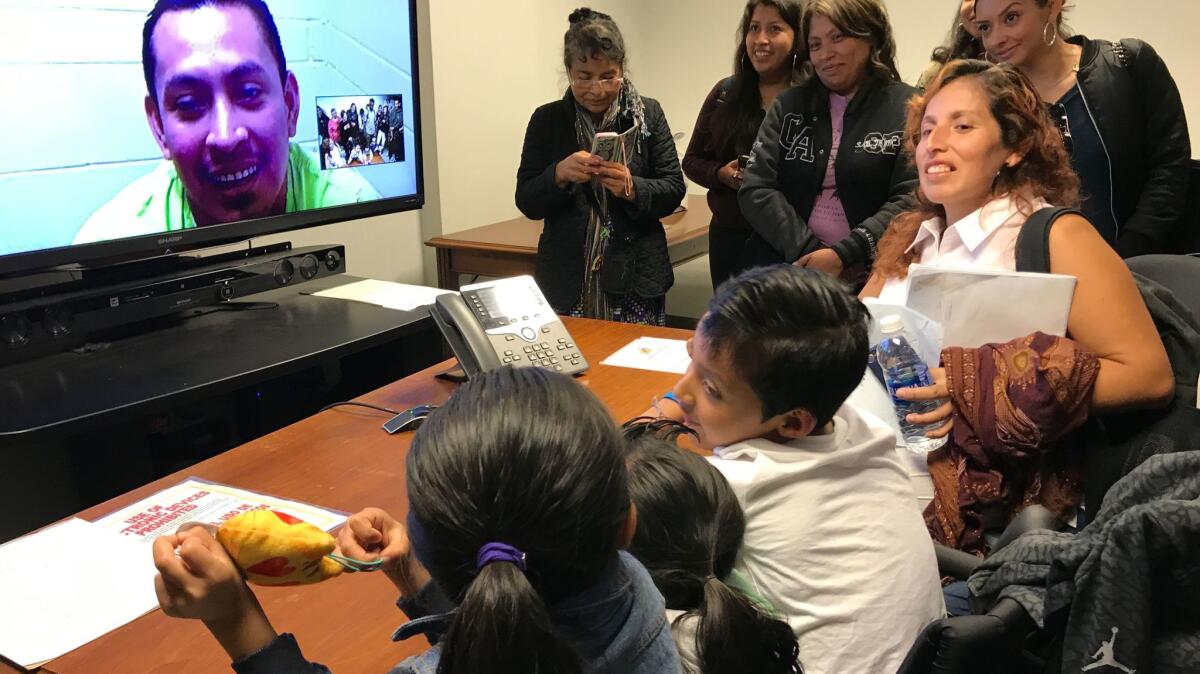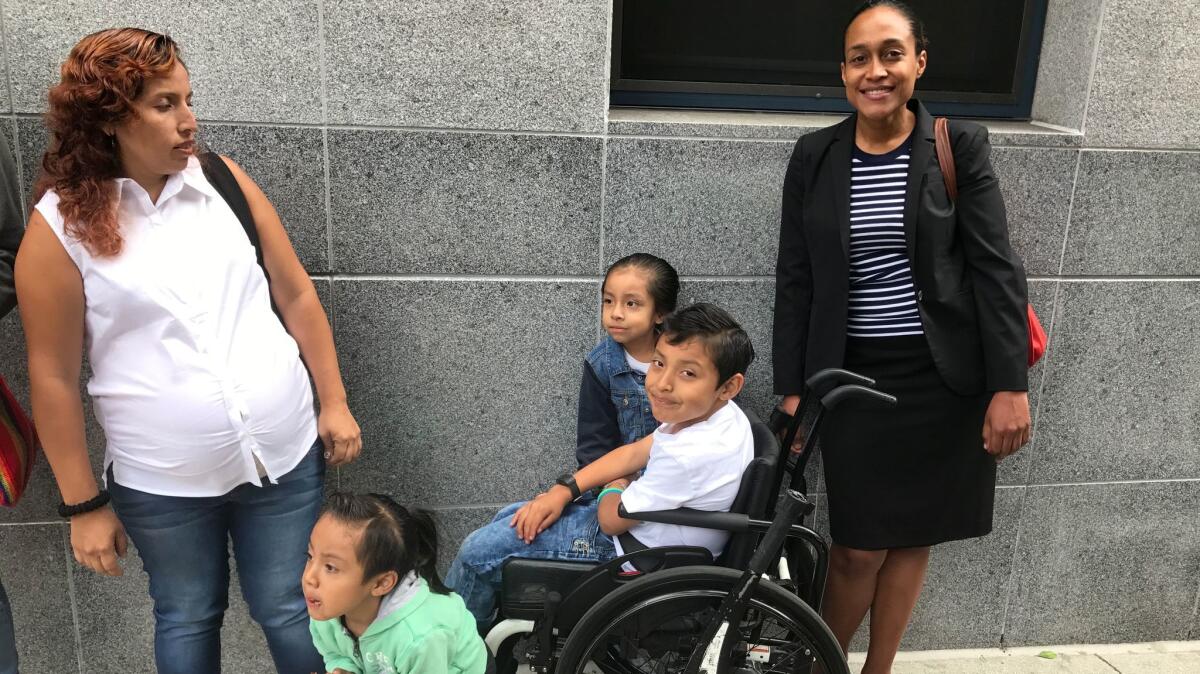California Journal: Some good news for a family whose jailed father is facing deportation to Guatemala

- Share via
Reporting from San Francisco — Federal immigration judge Valerie Burch was torn. You could see it in the way she scrunched up her mouth, the way she asked questions, the way she sighed.
The case before her was not easy.
The defendant was Maguiber Ramos, a 27-year-old undocumented man from Guatemala, father of three American children with a fourth on the way. His eldest son, Kevin, 9, has cerebral palsy.
Ramos was arrested in February by immigration officers, who knocked on his door pretending to be police investigating a hit-and-run accident. His attorney believes they were tipped off by sheriffs after he completed a week of community service for a reckless driving conviction.
Ramos, who has one previous deportation on his record, has been sitting in jail for six months. That’s how long it took to get a hearing. Thursday, he appeared in court, via a large monitor, beamed in from the Contra Costa County jail across the bay in Richmond.
From his vantage point, Ramos could only see the judge, his attorney and the prosecutor. But everyone in the courtroom, including his family, could see him, a handsome young man, dark hair slicked back, in a bright green jail suit.
The question before the judge: Should Ramos be allowed to live at home and support his family while awaiting a deportation hearing, or was he too dangerous to be freed? If he was safe to release, what amount of money — or bond — would be sufficient to ensure his return to court?

Earlier this month, I wrote sympathetically about Ramos’ case. I don’t believe our country is served by deporting him or keeping him in jail, and I heard from many angry readers.
There was the usual nasty, racist stuff. But I also heard from very thoughtful, pained folks who were disturbed by this family’s story. Ramos should not be entitled to stay, they wrote. He has been deported, he has broken the law, he keeps having children whom the state helps support.
I understand why they feel that way.
But here is a man who takes care of a growing family by doing maintenance at a hotel. His boss has promised he can return to his job, he testified. He supplements his income cleaning restaurants at night. Since he has been in jail, he said, he has not been able to help get Kevin to his twice weekly therapy appointments, which has taken a toll on his son’s progress.
Ramos told Burch he left Guatemala in 2010 because he was afraid for his safety after getting sideways with a gang, which beat him so badly he was bedridden for 15 days. Because of his previous deportation, he is not eligible for asylum. Instead he must meet a higher standard, showing that he has a 50% chance of persecution if he returns to Guatemala.
How valid are his fears? His mother, who is still in Guatemala, has signed a declaration attesting to his assault. And his attorney, Lisa Knox, has lined up an expert witness to testify at his deportation hearing. It will be up to the court to decide.
In the meantime, however, Burch wanted to make sure Ramos would remain sober.
“How will you deal with stress if you are released?” she asked.
Ramos said he would continue attending AA meetings and seek out a therapist.
“Is it OK if you have a drink now and then?” she asked.
“No,” said Ramos. “I don’t want to drink anymore.”
“Why not?” she pressed.
“Because I caused a lot of harm to my son being in here because of alcohol.”
“If you are released,” she asked, “are you aware the case is not over? Will you appear for all court dates?
He replied yes. She kept grilling: “Why?”
“I don’t want to have to hide from the police,” he said. “And I don’t want to harm my son.”
“You know that if you lose, you have to present yourself for deportation?”
“Yes,” he said.
An hour into the three-hour hearing, the judge picked up her remote control.
“You have a lot of supporters here,” she said as she used the remote to swivel a camera so Ramos could see his children, who were sitting with their mother, Yibi Heras, in the front row. Behind them, he saw dozens of supporters who had crowded into the small courtroom.
Everyone had been instructed to stay quiet. But when the kids saw that their father could see them, and was smiling at them, the little ones yelled out. Laughter rippled through the courtroom.
There’s a good reason why the judge seemed conflicted.
In 2008, at age 18, Ramos pleaded guilty to being under the influence of cocaine provided by his cousin. It was the first time he tried cocaine, he said in court Thursday.
“The first time you used it you got caught?” asked the skeptical prosecutor, Jonathan Yu, an assistant chief counsel with U.S. Immigration and Customs Enforcement.
As a result of the cocaine conviction, Ramos was deported. At the time, Heras was pregnant with their son Kevin. He returned to the U.S. in 2010, and lived quietly with his growing family until July 2016. After drinking beer and watching a soccer game with friends, he said, he got into his car to drive home. Two friends were with him.
On a bridge, his tire began making noise, so he pulled over to check it. He was standing outside his car when officers arrived. The cops smelled alcohol and performed a field sobriety test. Ramos pleaded guilty to reckless driving, performed community service and attended 30 AA meetings.
“How many times have you driven drunk?” Burch asked.
“That was the first time,” Ramos replied.
“How many years have you been driving without a license?” Yu asked.
“Since 2014,” Ramos replied.
You can see why this case gave the judge heartburn.
In the end, Burch found the government had not made its case that Ramos was a danger or that he posed an insurmountable flight risk.
“It would be hard for him to abscond given the child on the way and a child with cerebral palsy,” she said. She believed that his reckless driving conviction was a singular event, she said, and that he was not likely to reoffend. “He has strong community ties, as demonstrated by all the people here, and that makes a difference as well.”
She granted his request for release on bond, which she set at $3,500 — high enough to make sure he shows up at his next hearing, but low enough that he could come up with the money.
Late Friday, he was released from jail.
His case is far from over, but at least for now, a family of five — almost six — remains intact.
To read the article in Spanish, click here
Twitter: @AbcarianLAT
More to Read
Sign up for Essential California
The most important California stories and recommendations in your inbox every morning.
You may occasionally receive promotional content from the Los Angeles Times.











